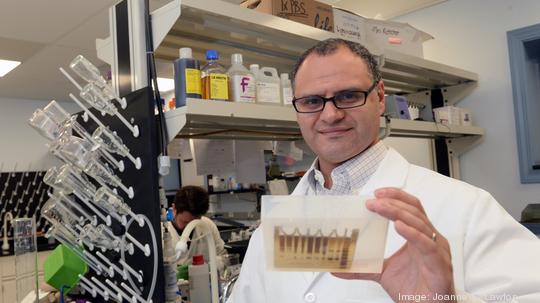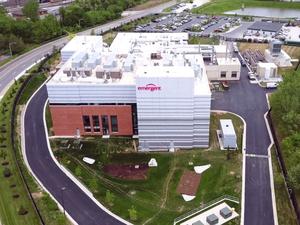
A local biotech has secured millions of dollars in new investments to take its RNA therapies for drug-resistant cancers to the clinic.
Gaithersburg’s miRecule Inc. has raised $5.7 million in fresh funding, CEO Anthony Saleh told us Monday, positioning the company to start human testing for its lead candidate to treat head and neck cancer.
Specifically, miRecule is now scaling up and manufacturing drug substance so it can submit an investigational new drug application to the Food and Drug Administration — required to be able to initiate clinical testing. The goal is to start a phase 1 study by 2023, Saleh said.
To get there, Saleh added, miRecule would look to raise a Series A round in the second half of 2022.
Alexandria Venture Investments, the venture capital arm of Pasadena, California-based Alexandria Real Estate Equities, led the latest round. Chicago’s Pathway Bioventures; Boutique Venture Partners of Palo Alto, California, Alumni Ventures Group of Manchester, New Hampshire; and angel investors participated, as well as the University System of Maryland’s Maryland Momentum Fund and the Lexington, Massachusetts-based FSHD Society. The funding also includes $2 million from the National Cancer Institute in the form of a Small Business Innovation Research grant.
The cash injection builds upon $1 million miRecule secured in 2019 for preclinical research, after opening the raise the previous summer. The business also took in about $1.7 million in friend-and-family investments, grants and contracts prior to the latest raise.
The biotech’s lead candidate “could be a real game-changer,” Saleh said in an email. “By correcting the underlying mutation that creates resistance to treatment, we think we can triple response rates and give years of quality life back to many patients.”
To do it, miRecule’s technology platform evaluates patients’ tumor tissue to determine which microRNA therapies would be most effective, then runs a test to assess whether replacing that microRNA would successfully kill the cancer cells. The drug itself would mimic the patients’ natural microRNA, genes that can prevent tumors from growing but that cancer patients lack.
Saleh sees broader applications for the platform, which analyzes patient data to identify genetic causes of disease before designing the RNA therapeutics to address them. MiRecule is also using it in a type of muscular dystrophy called Facioscapulohumeral Muscular Dystrophy (FSHD), which affects more than 40,000 U.S. patients and has no approved treatments.
The company is also looking at the platform’s potential with viruses — including the virus that causes Covid-19. The company identified a microRNA therapeutic that can inhibit the coronavirus and reduce the mechanism that causes many of the symptoms and inflammatory side effects of Covid, Saleh said, adding that the program is in the early discovery phase “and we would need a partner or additional funding to advance this asset.”
MiRecule moves forward with its pipeline as RNA treatments capture increasing interest, fueled by the success of messenger RNA — or mRNA — vaccines for Covid. Those products, from Pfizer and Moderna, were the first FDA-approved vaccines to use mRNA technology.
Other D.C.-area companies are finding opportunity in the space. Gaithersburg’s Sirnaomics doubled down on mRNA with the June 2020 launch of RNAimmune, which is developing mRNA vaccine and drug programs for high unmet medical needs in infectious disease, rare disease and cancer. Netherlands-based Qiagen NV (NYSE: QGEN), which has been expanding its Covid-19 testing capacity at its U.S. headquarters in Germantown, counts RNA extraction kits among its Covid diagnostic products. And Montgomery County’s VLP Therapeutics has a Japanese subsidiary that’s developing a Covid vaccine using RNA technology.
For miRecule, the long game involves licensing its technology to, or co-developing other assets with, larger pharmaceutical companies — which would have the capacity to market the therapeutics at a bigger scale. That would allow miRecule to advance its other programs, Saleh said, including its candidate for muscular dystrophy, and further expand its platform to other oncology and neuromuscular areas.
Now with six employees, miRecule is bringing on a new vice president of research starting this week, and expects to hire a vice president of clinical development and another three research team members, Saleh said.
The company was born from Saleh’s work as an oncology researcher at the National Cancer Institute, part of the National Institutes of Health. In 2016, he spun miRecule out of the NIH, which has a licensing deal with the biotech for the technology. He then grew miRecule from the BioHealth Innovation (BHI) incubator, which supports the bioscience and health tech industries.
Saleh, both a scientist and biotech entrepreneur, was also president of Mimetas U.S., the American subsidiary of Dutch biotech Mimetas BV. He took that position as the company was working to establish a U.S. branch with BHI. He stepped down from that role in 2019 when miRecule raised its first private investment.




